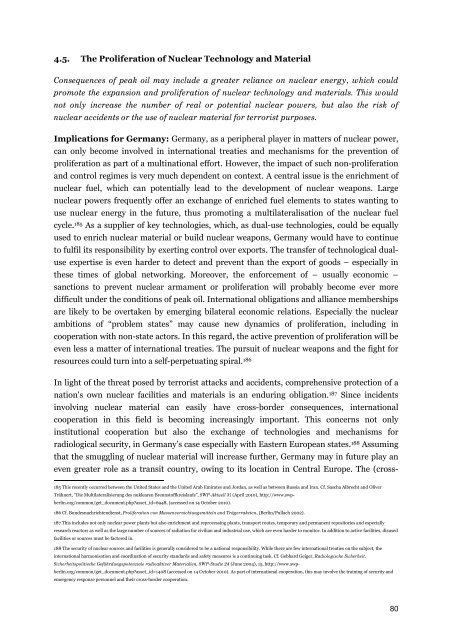PEAK OIL
PEAK OIL
PEAK OIL
Create successful ePaper yourself
Turn your PDF publications into a flip-book with our unique Google optimized e-Paper software.
4.5. The Proliferation of Nuclear Technology and Material<br />
Consequences of peak oil may include a greater reliance on nuclear energy, which could<br />
promote the expansion and proliferation of nuclear technology and materials. This would<br />
not only increase the number of real or potential nuclear powers, but also the risk of<br />
nuclear accidents or the use of nuclear material for terrorist purposes.<br />
Implications for Germany: Germany, as a peripheral player in matters of nuclear power,<br />
can only become involved in international treaties and mechanisms for the prevention of<br />
proliferation as part of a multinational effort. However, the impact of such non-proliferation<br />
and control regimes is very much dependent on context. A central issue is the enrichment of<br />
nuclear fuel, which can potentially lead to the development of nuclear weapons. Large<br />
nuclear powers frequently offer an exchange of enriched fuel elements to states wanting to<br />
use nuclear energy in the future, thus promoting a multilateralisation of the nuclear fuel<br />
cycle. 185 As a supplier of key technologies, which, as dual-use technologies, could be equally<br />
used to enrich nuclear material or build nuclear weapons, Germany would have to continue<br />
to fulfil its responsibility by exerting control over exports. The transfer of technological dualuse<br />
expertise is even harder to detect and prevent than the export of goods – especially in<br />
these times of global networking. Moreover, the enforcement of – usually economic –<br />
sanctions to prevent nuclear armament or proliferation will probably become ever more<br />
difficult under the conditions of peak oil. International obligations and alliance memberships<br />
are likely to be overtaken by emerging bilateral economic relations. Especially the nuclear<br />
ambitions of “problem states” may cause new dynamics of proliferation, including in<br />
cooperation with non-state actors. In this regard, the active prevention of proliferation will be<br />
even less a matter of international treaties. The pursuit of nuclear weapons and the fight for<br />
resources could turn into a self-perpetuating spiral. 186<br />
In light of the threat posed by terrorist attacks and accidents, comprehensive protection of a<br />
nation's own nuclear facilities and materials is an enduring obligation. 187 Since incidents<br />
involving nuclear material can easily have cross-border consequences, international<br />
cooperation in this field is becoming increasingly important. This concerns not only<br />
institutional cooperation but also the exchange of technologies and mechanisms for<br />
radiological security, in Germany’s case especially with Eastern European states. 188 Assuming<br />
that the smuggling of nuclear material will increase further, Germany may in future play an<br />
even greater role as a transit country, owing to its location in Central Europe. The (cross-<br />
185 This recently occurred between the United States and the United Arab Emirates and Jordan, as well as between Russia and Iran. Cf. Sascha Albrecht and Oliver<br />
Trähnert, “Die Multilateralisierung des nuklearen Brennstoffkreislaufs”, SWP-Aktuell 31 (April 2010), http://www.swpberlin.org/common/get_document.php?asset_id=6948,<br />
(accessed on 14 October 2010).<br />
186 Cf. Bundesnachrichtendienst, Proliferation von Massenvernichtungsmitteln und Trägerraketen, (Berlin/Pullach 2002).<br />
187 This includes not only nuclear power plants but also enrichment and reprocessing plants, transport routes, temporary and permanent repositories and especially<br />
research reactors as well as the large number of sources of radiation for civilian and industrial use, which are even harder to monitor. In addition to active facilities, disused<br />
facilities or sources must be factored in.<br />
188 The security of nuclear sources and facilities is generally considered to be a national responsibility. While there are few international treaties on the subject, the<br />
international harmonisation and coordination of security standards and safety measures is a continuing task. Cf. Gebhard Geiger, Radiologische Sicherheit.<br />
Sicherheitspolitische Gefährdungspotenziale radioaktiver Materialien, SWP-Studie 24 (June 2004), 15, http://www.swpberlin.org/common/get_document.php?asset_id=1408<br />
(accessed on 14 October 2010). As part of international cooperation, this may involve the training of security and<br />
emergency response personnel and their cross-border cooperation.<br />
80


